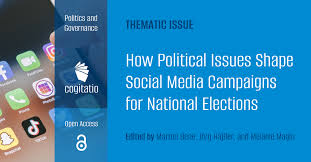
Technology has revolutionized political campaigns, transforming how candidates connect with voters, raise funds, and shape public opinion. By 2025, digital tools and platforms are at the heart of every campaign strategy, enabling unprecedented reach, personalization, and data-driven decision-making.
Let’s explore how technology is shaping political campaigns and what this means for the future of democracy.
1. Data-Driven Voter Targeting
Advanced data analytics allow campaigns to:
- Identify and segment voters based on demographics, interests, and behaviors.
- Deliver personalized messages tailored to specific audiences.
- Predict voter turnout and optimize resource allocation.
This precision targeting increases campaign effectiveness and voter engagement.
2. Social Media and Digital Outreach
Social media platforms are critical for:
- Building candidate brands and communicating directly with the public.
- Mobilizing supporters and organizing events.
- Countering misinformation and managing campaign narratives.
Digital outreach enables real-time interaction and viral content sharing.
3. Fundraising and Small Donor Engagement
Online fundraising tools have democratized political contributions by:
- Making it easy for supporters to donate through websites and apps.
- Using AI to identify potential donors and craft personalized appeals.
- Hosting virtual events to engage and motivate supporters.
Technology expands fundraising beyond traditional networks.
4. Artificial Intelligence and Automation
AI enhances campaigns by:
- Automating routine tasks like email responses and social media posts.
- Analyzing sentiment and feedback to adjust messaging strategies.
- Chatbots providing instant voter assistance and information.
Automation increases efficiency while maintaining voter engagement.
5. Challenges and Ethical Concerns
The rise of tech in campaigns also raises issues:
- Privacy risks from extensive voter data collection.
- Spread of fake news and disinformation.
- Use of microtargeting to manipulate voter behavior.
- Ensuring transparency and accountability in digital campaigning.
Regulation and ethical standards are essential to safeguard democracy.
6. The Future of Political Campaigns
Looking ahead, campaigns will:
- Integrate virtual and augmented reality for immersive voter experiences.
- Leverage blockchain for secure voting and transparent fundraising.
- Use big data and AI for even deeper insights.
- Engage voters through multi-channel, personalized strategies.
Technology will continue to reshape how politics is conducted.
Final Thoughts
Technology is a powerful force shaping modern political campaigns—enhancing communication, engagement, and fundraising. While offering many benefits, it also presents challenges that require vigilance and ethical oversight.
By harnessing technology responsibly, political campaigns can strengthen democracy and better connect with the people they serve.
